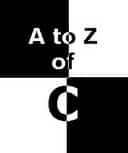Posted on March 18th, 2012

“A to Z of C”, by R. Rajesh Jeba Anbiah & K. Joseph Wesley, is an evolving non-profit book on C/DOS/Turbo C programming. Each chapter of this book can be downloaded in pdf format.
- ANSI C
- DOS Programming
- Advanced Graphics Programming
- Advanced Programming
- Mathematics & C
- Algorithms & C
- Illegal Codes
- Next Step
- Smart Dictionary
- Postlude
Author(s): R. Rajesh Jeba Anbiah & K. Joseph Wesley
Format(s): PDF
Link: Download.



